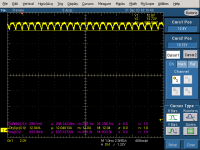Over the last few months I have a whine in my headphones coming from an alternator. This is new. For 600+ hours the alternators were quiet. It started a few months ago, Initially the whine was only from main alternator (PlanePower 60A) and only after startup when charging high amps (about 50-60 amps for couple of minutes, then decreasing, EarthX battery). It would go away as amps got lower. It was also only heard on No. 2 radio initially (GNC 255), and only from main alternator. Backup alternator (B+C 40A) was quiet when switched to backup. Overt time the whine has gotten louder and constant and now whines all the way to maintenance charging rate, does same on both alternators and now on both radios (GTN 750). Both alternator off and whine goes away.
Last week I removed main alternator and installed a brand new PlanePower alternator that I had. This made no difference in the noise, still on both radios as well as backup alternator. Looking at the diodes on the removed alternator there was nothing suspicious.
The engine is well grounded (I have 4 grounding straps), starter turns engine vigorously. All lights and avionics grounding come together at a single point as designed by Stein Air. No recent changes done to wiring. Both alternators charge as expected with amps changing as load is applied and voltage stable at 14.3-14.4V. The whine is clearly RPM related with pitch increasing as RPM increases. All alternator related contacts are secure. Both alternators now whine at idle RPM.
Where do I go from here?
Thank you.
Johan
Last week I removed main alternator and installed a brand new PlanePower alternator that I had. This made no difference in the noise, still on both radios as well as backup alternator. Looking at the diodes on the removed alternator there was nothing suspicious.
The engine is well grounded (I have 4 grounding straps), starter turns engine vigorously. All lights and avionics grounding come together at a single point as designed by Stein Air. No recent changes done to wiring. Both alternators charge as expected with amps changing as load is applied and voltage stable at 14.3-14.4V. The whine is clearly RPM related with pitch increasing as RPM increases. All alternator related contacts are secure. Both alternators now whine at idle RPM.
Where do I go from here?
Thank you.
Johan





